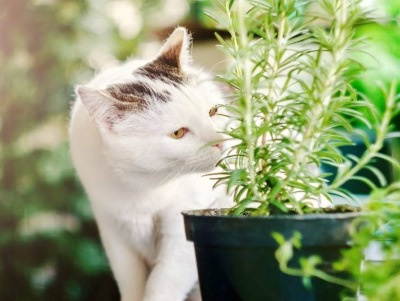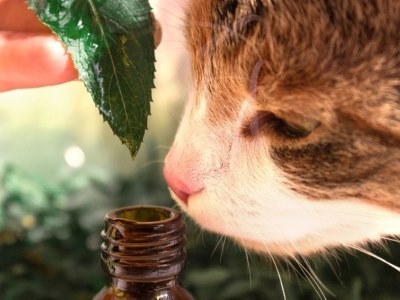With its fragrant leaves and adaptability in the cooking, rosemary has long been a mainstay in kitchens and gardens all across the world.

However, as a responsible cat owner, you must think about the possible effects of introducing this plant to your feline friend’s surroundings.
We’ll explore the topic of rosemary safety for cats in this article.
To assist you in making decisions concerning the welfare of your cherished pet, we’ll examine the possible advantages, hazards, and professional viewpoints.
Is Rosemary Toxic to Cats?
Yes, rosemary is considered poisonous to cats. While rosemary may be a commonly utilized herb in cooking and has potential wellbeing benefits for people, its fundamental oils and compounds can be destructive to cats.
Cats need certain chemicals in their liver that help them handle these compounds, making them more defenseless to the poisonous impacts of substances like rosemary.

Cats who consume rosemary may have a variety of negative effects, including gastrointestinal discomfort, vomiting, diarrhea, excessive drooling, and even neurological system problems[1].
In extreme circumstances, consuming poisonous doses of rosemary might cause more significant health problems[2] that call for veterinary assistance.
It is best to keep your cat away from rosemary due to the possible hazards involved with intake. Instead, think about providing safe options for sensory enrichment for cats like cat grass, catnip, or valerian.
For advice and the proper course of action, if you believe your cat has consumed rosemary or any other potentially dangerous substance, you must immediately call your veterinarian.
Health Benefits of Rosemary for Cats
While rosemary is considered toxic to cats and should generally be avoided in their diet, it’s important to note that some of its properties, such as essential oils and compounds, can pose potential health risks to felines.
As obligate carnivores, cats have specific dietary needs that differ from those of humans, and introducing herbs like rosemary into their diet can lead to adverse effects.
However, there are other ways to promote your cat’s well-being without using potentially harmful herbs like rosemary.

Providing a balanced and species–appropriate diet, regular veterinary care, appropriate play and mental stimulation, and a safe and enriching environment are some of the best ways to support your cat’s health[3].
Before altering your cat’s nutrition[4] or adding new items to their environment, always seek the advice of a veterinarian.
Based on the particular requirements and health situation of your cat, your veterinarian might offer tailored suggestions and recommendations.
How Much Rosemary Can Cats Eat?
It’s vital to remember that rosemary is typically regarded as harmful to cats and should not be consumed by them.
The essential oils and terpenes in rosemary, which are present in certain amounts in cats’ diets, may be harmful to their health since cats’ nutritional needs differ from those of humans.
These substances are dangerous even in tiny doses because they can cause nervous system disruptions, excessive drooling, vomiting, diarrhea, and gastrointestinal trouble.

Given the potential risks associated with rosemary ingestion, it is advisable to err on the side of caution and completely avoid feeding rosemary to cats.
Instead, focus on providing a nutritionally balanced and appropriate diet for your cat’s specific needs.
If you have any concerns about your cat’s diet or health, it’s always best to consult with a veterinarian who can offer professional guidance and recommendations tailored to your feline friend’s well-being.
What About Rosemary Essential Oil?
Cats are more at risk from rosemary essential oil since it is thought to be much more concentrated and strong than the herb itself.
Essential oils are extracts that have been greatly distilled and may include substances that are hazardous to cats, even in minute quantities.
Cats are more vulnerable to the negative effects of essential oils because they lack particular liver enzymes that aid in the metabolization and elimination of these substances.
Ingesting or coming into contact with rosemary essential oil can lead to a range of health issues in cats, including gastrointestinal upset, difficulty breathing, drooling, vomiting, lethargy, and even more severe symptoms like liver damage or nervous system disturbances.

Inhalation of essential oil aromas can also be harmful to cats and may lead to respiratory issues[5].
Due to these risks, it is strongly advised to avoid using rosemary essential oil or any other essential oil around cats.
If you’re seeking ways to enhance your cat’s environment, consider using cat–safe products recommended by veterinarians, and always consult with a veterinarian before introducing any new substances into your cat’s living space.
The safety and well-being of your feline companion should always be your top priority.
FAQs
Can I give my cat a small amount of rosemary as a treat?
Cats shouldn’t be given rosemary as a treat since it is thought to be poisonous to them. A modest amount of rosemary has the potential to have negative effects and cause health problems.
Is rosemary safe if used externally, like in a cat-safe room spray?
While using rosemary essential oil externally might seem harmless, cats can still be sensitive to its aroma and compounds. It’s better to err on the side of caution and avoid using rosemary or any essential oils in products that come into contact with your cat.
Can rosemary be used for flea control in cats?
Due to its probable toxicity, rosemary is not advised for cat flea management. For cat-specific, safe, and efficient flea management strategies, speak with your veterinarian.
Are there any herbs or plants that are safe for cats to enjoy?
Yes, there are cat-safe herbs and plants, such as cat grass and catnip, that can provide sensory enrichment for your feline friend without posing the same risks as potentially toxic herbs like rosemary.
What should I do if my cat shows signs of discomfort after exposure to rosemary?
Contact your veterinarian right away for the necessary examination and care if your cat displays any odd behavior, discomfort, or negative symptoms as a result of exposure to rosemary or any other chemical.
Conclusion
Rosemary and cats are not a great combination. While rosemary is non-toxic to cats, it isn’t consumable or advantageous for them. As well, too much rosemary can cause stomach-related issues for your cat, and rosemary basic oil can be dangerous for them.
In this manner, it is best to keep rosemary away from your cat and counsel your veterinarian about giving your cat any herbs or basic oils.
Reference:
- Neurological disorders | Cornell University College of Veterinary Medicine
- 6 Most common cat health problems | WebMD
- Health Care Guidelines for Cats | VCA Animal Hospitals. (n.d.). Vca
- Feeding your cat | Cornell University College of Veterinary Medicine
- Respiratory infections | Cornell University College of Veterinary Medicine

Charlene Pare is the founder of Cat Likes Best. She manages and strategizes the content published on this website. When she isn’t working, she enjoys exploring the city around with her Ameican Shorthair kitty–Moli. Being a technocrat and an avid cat lover, she also writes on pet tech products and some of the featured articles.

